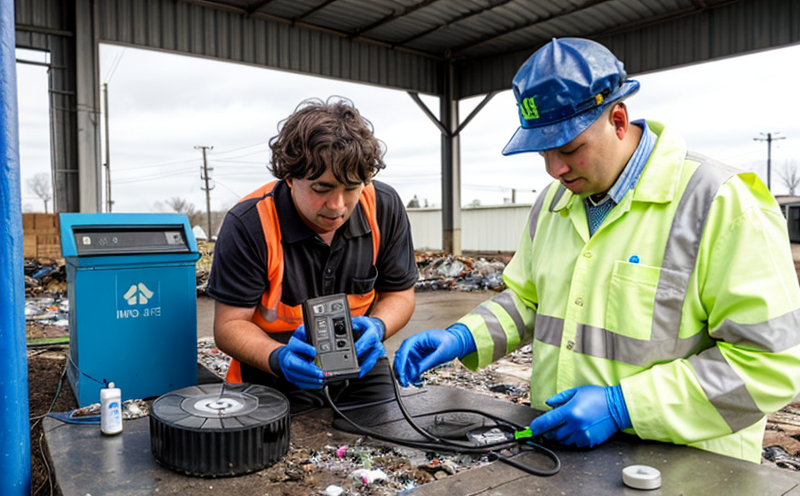IEC 62133 Safety Testing of Portable Battery Cells and Packs
The IEC 62133 standard is a crucial specification for ensuring safety in portable battery cells and packs. This standard addresses the various hazards that can arise during the production, use, and disposal phases of these batteries. It covers requirements related to electrical integrity, mechanical stability, thermal management, and chemical compatibility. Compliance with IEC 62133 not only helps manufacturers meet regulatory standards but also enhances product safety in the marketplace.
Our laboratory specializes in providing comprehensive testing services that are aligned with this standard. We understand the importance of ensuring that battery cells and packs perform safely under a wide range of conditions, from high current discharges to thermal stress tests. Our team uses state-of-the-art equipment and methodologies to replicate real-world scenarios that batteries might encounter during their lifecycle.
One of the key aspects of IEC 62133 testing is ensuring electrical integrity. This involves assessing the battery's ability to withstand overcurrent conditions without short-circuiting or overheating. Our facilities are equipped with specialized equipment capable of simulating these conditions, allowing us to provide accurate and reliable test results.
Thermal management tests are also critical under this standard. These tests evaluate how well a battery can handle extreme temperatures, both hot and cold, without failing. Our laboratory houses controlled environments where we can simulate various temperature profiles to assess the thermal stability of batteries. This helps manufacturers understand the potential risks associated with improper thermal design.
Another important aspect is mechanical stability testing. Here, we subject battery cells and packs to various forms of physical stress—such as drop tests, compression tests, and vibration tests—to ensure they can withstand typical handling conditions without compromising safety or performance. Our lab uses industry-standard fixtures that replicate real-world usage scenarios.
Chemical compatibility is another critical factor in IEC 62133 testing. This involves assessing the risk of chemical reactions between different components within a battery, which could lead to hazardous situations if not managed properly. Our laboratory has the expertise and resources necessary to perform these tests accurately and comprehensively.
Compliance with IEC 62133 is essential for any company involved in the design, manufacture, or distribution of portable batteries. It helps ensure that products meet international safety standards, thereby protecting consumers from potential hazards while fostering confidence among end-users.
In summary, our laboratory offers robust testing services designed specifically to help clients achieve compliance with IEC 62133. By leveraging our advanced facilities and experienced technical staff, we can provide detailed insights into the performance characteristics of portable batteries under various conditions.
Eurolab Advantages
At Eurolab, we pride ourselves on delivering unparalleled quality and reliability in all aspects of testing. Our state-of-the-art laboratory facilities are equipped with cutting-edge technology that ensures precise and accurate results every time. With years of experience behind us, our team of experts can offer valuable insights into how best to interpret test data for your specific needs.
One major advantage of working with Eurolab is our commitment to staying abreast of the latest developments in international standards. This allows us to provide up-to-date testing services that meet current regulatory requirements. Whether you're looking to ensure compliance with IEC 62133 or other relevant standards, we have the expertise and resources needed.
We also offer flexible service options tailored to fit your schedule and budget. Our experienced staff can work closely with you throughout the testing process, providing guidance whenever necessary. Additionally, our competitive pricing ensures that high-quality testing remains accessible to businesses of all sizes.
Finally, Eurolab is dedicated to maintaining strong relationships with its clients through ongoing communication and support. We value our partnerships deeply and are committed to ensuring customer satisfaction at every stage of the project. By choosing us as your partner in testing, you can rest assured that your needs will be met with professionalism and dedication.
International Acceptance and Recognition
- IEC 62133 is widely recognized across Europe, Asia, Africa, the Americas, and Oceania as a key standard for ensuring battery safety in portable devices.
- The standard's broad acceptance means that compliance with these requirements can open up markets globally while helping manufacturers maintain consistent quality standards worldwide.
- Compliance also facilitates smoother international trade by reducing barriers to entry into new regions where stringent safety regulations are in place.
- Many countries have adopted IEC 62133 as their national standard, ensuring that products certified according to this specification can be used confidently everywhere.
Environmental and Sustainability Contributions
The testing of portable battery cells and packs according to the IEC 62133 standard plays a vital role in promoting environmental sustainability. By ensuring that batteries are designed, manufactured, and operated safely, we help reduce the risk of accidental fires or explosions which could otherwise contribute significantly to pollution and waste.
Moreover, compliance with this standard encourages manufacturers to adopt more sustainable practices throughout their supply chains. For instance, safer battery designs lead to longer lifespans, reducing the frequency of replacements needed and thus minimizing electronic waste generation. Additionally, by preventing failures that could result in hazardous materials leaking into the environment, we contribute positively towards cleaner air and water.
At Eurolab, we recognize the importance of environmental stewardship and strive to incorporate sustainable practices wherever possible within our operations. This includes using energy-efficient equipment during tests and recycling waste products generated from testing processes when feasible.
In conclusion, IEC 62133 testing contributes not only directly towards enhancing product safety but also indirectly through fostering greater responsibility among manufacturers regarding their environmental impact. By embracing this standard, companies can play a pivotal role in building a more sustainable future for all.





